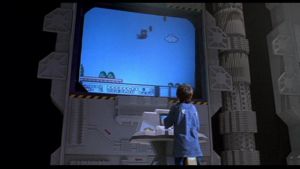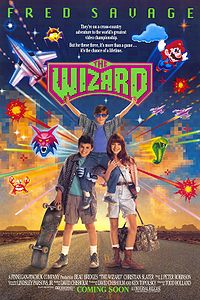List of references in film
It has been requested that this article be rewritten and expanded to include more information.
3 Ninjas
In the first quarter of this Disney classic, the kids are seen sitting in front of a television set playing Super Mario Bros. 3 for NES.
Alvin and the Chipmunks: the Squeakquel
In a scene where Alvin is fighting with a bully, he says "It is on like Donkey Kong!"
Beethoven
In the movie, Ted plays Super Mario Bros. 3 on the NES.
Billy Madison
During a scene in the lunchroom, Billy (played by Adam Sandler) and one of his first grade peers get into a debate over Mortal Kombat and Donkey Kong.
Kid: Mortal Kombat, on the Sega Genesis, is the best video game ever.
Billy: I disagree. It's a very good game, but I think Donkey Kong is the best game ever.
Kid: Donkey Kong sucks!
Billy: You know something? YOU SUCK!
Diary of a Wimpy Kid
During the Halloween scene, when Greg starts a leaf blower, it makes a Bowser roar. Also, when Greg and Rowley are playing Twisted Wizard, they use Wii Remotes as controllers.
Freddy's Dead: The Final Nightmare
Soon after being sucked into a NES game by Freddy, Spencer enters a red colored Warp Pipe. Later on, in order to combat Freddy in the game, Spence eats a fruit (resembling the one's from Super Mario World) to power-up and become "Super Spencer".
Ghostbusters II
When Janine and Louis are babysitting Oscar, Louis suggests that they could play Super Mario Bros..
Hot Tub Time Machine
When Adam, Nick, Jacob and Lou pan over the stuff from the 80s, a poster for Super Mario Bros. is seen.
Marley & Me
John Grogan mentions that before he went into college, he had no expectations for himself, having spent his time doing bong hits (inhaling marijuana through a bong) and playing Donkey Kong.
The Master of Disguise
After all the credits it is revealed that Mario (refereed to as the Slapping Dummy Man) has been controlling the "Slapping Dummy".
Percy Jackson & The Lightning Thief
When the heroes go to Las Vegas Hotel & Casino, Lotus, a Mario Bros. arcade can be seen among other arcades.
Son of the Mask
In the car, the man (named Tim avery) was playing Mario Kart Super Circuit as Luigi.
The Fast and the Furious: Tokyo Drift
On the elevator to the race, Twinkie asks Sean what DK stands for (which actually stands for 'Drift King'), and Sean replies 'Donkey Kong?'
Teen Titans: Trouble in Tokyo
In the movie, Super Mario Bros. can be seen in the background of the arcade.
The Longest Yard
At one point, they call the main character (Paul Crewe) Paul "Wrecking" Crewe.
The Wizard
In perhaps the most prominent outside sighting of Mario, Super Mario Bros. 3 is featured as the game played in the final event of the Video Armageddon competition at the end of the film. As the scene progresses, protagonist Jimmy Woods (played by Luke Edwards) manages to find the Warp Whistle in the World 1 Fortress and wins the competition by warping to World 4 (which wouldn't actually score extra points in the game itself; the competition probably has a different scoring system). Curiously, the audience become immediately aware of how the game is played, despite the fact that at the time of the film's release, the game would not be available for another three months. Additionally, the emcee at the Video Armageddon announces several level names incorrectly (for instance, calling level 1-3 "World 2").
In addition, Super Mario Bros. 2 is also mentioned and seen being played occasionally at earlier points in the film. Sound effects from Super Mario Bros. can also be heard at a few points as well. Additionally, Mario was prominently featured in the background of the film's poster artwork (which was later reused as the box art for the VHS release).
Template:References

